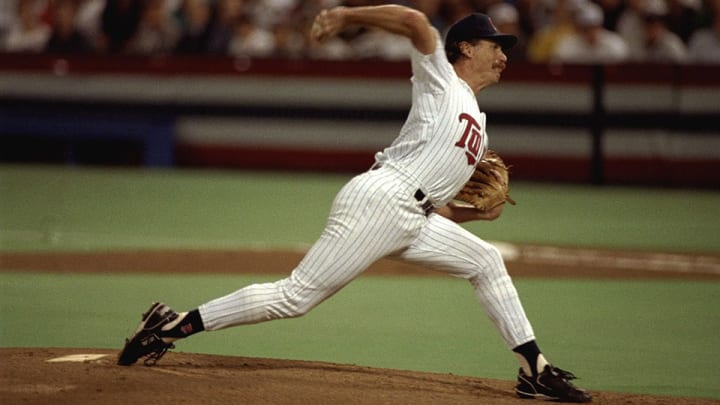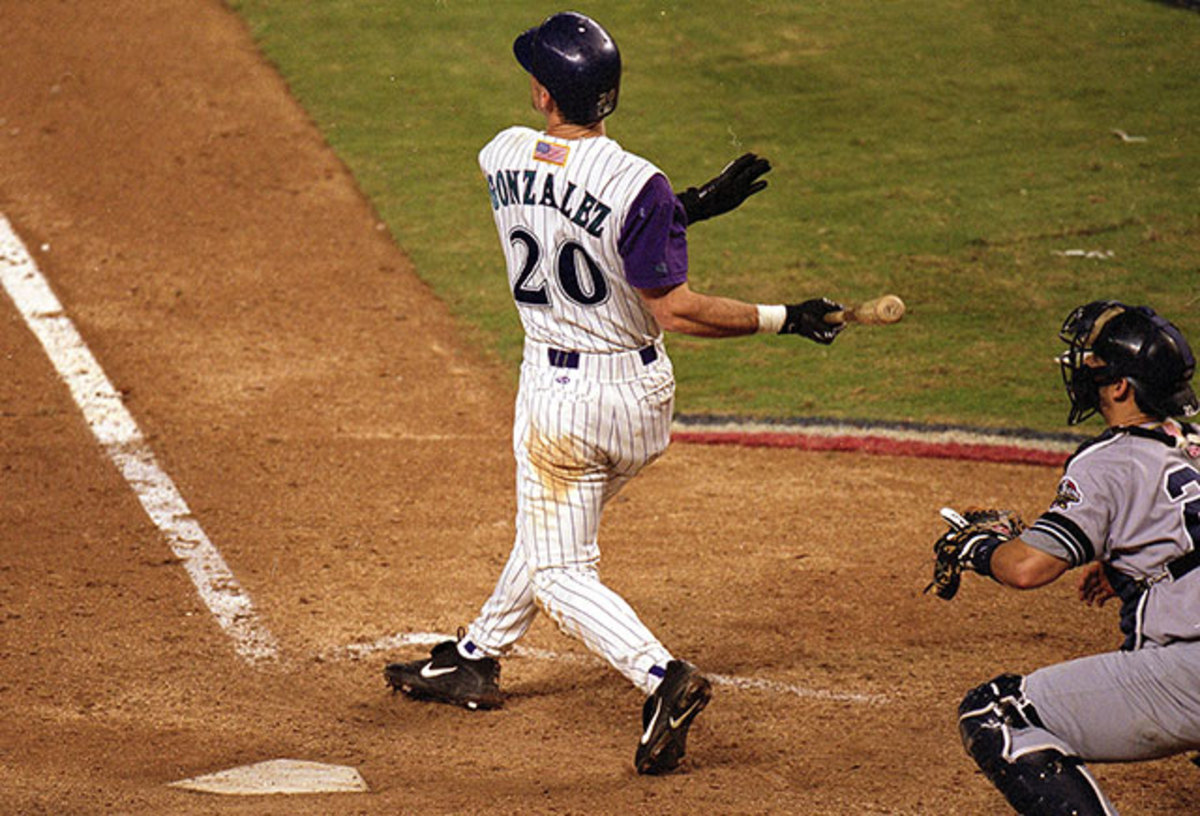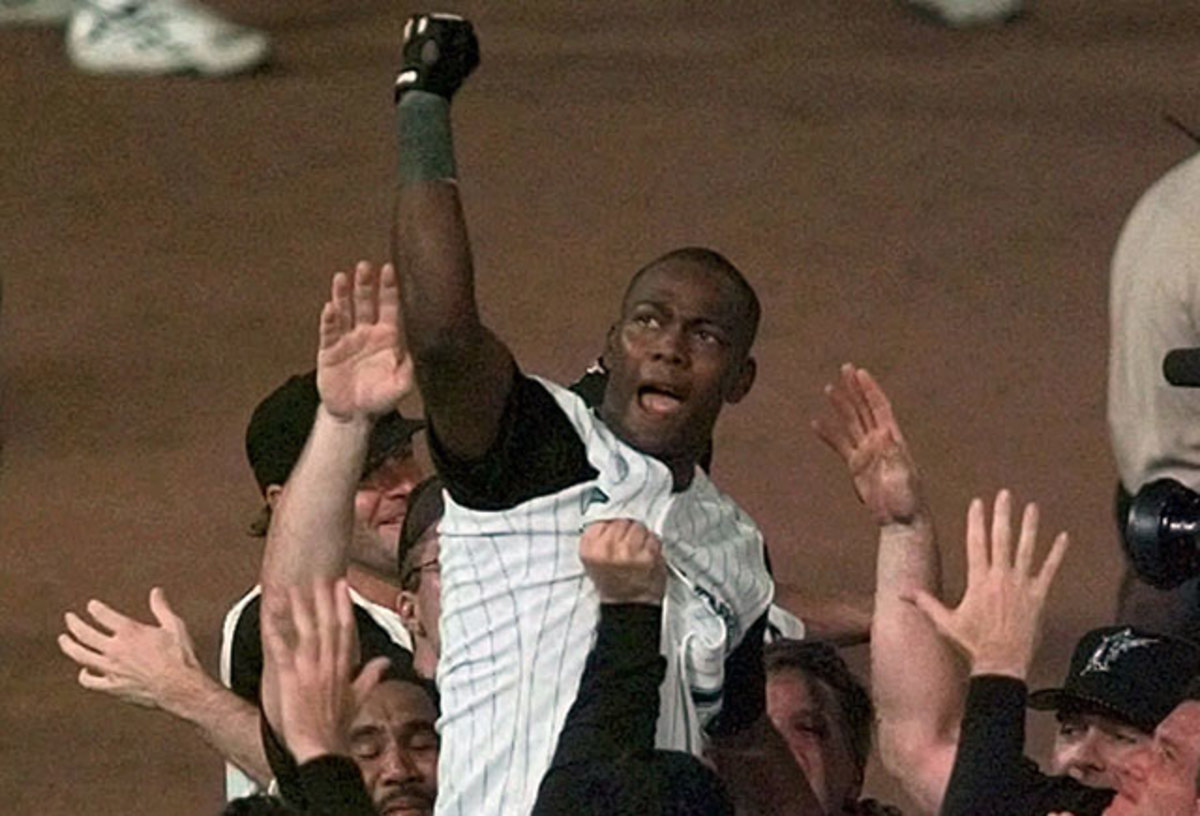Was 1991 Twins-Braves best Game 7 in World Series history? Not quite

Twenty-five years ago, the Twins and Braves faced off in one of the most thrilling World Series in major league history. Their seven-game showdown included three extra-inning games, all of them walk-off wins for the home team, and five games in which the winning run was scored in the victor’s final at-bat. It is best remembered, however, for the epic Game 7 showdown between Minnesota’s Jack Morris and Atlanta’s John Smoltz, a game which went scoreless into extra innings before the Twins won, 1–0, on a walk-off single by pinch-hitter Gene Larkin in the bottom of the 10th.
With the Twins and Braves wrapping up a two-game interleague set in Minneapolis on Wednesday night, we thought we’d explore where that game ranks among the greatest Games 7 in World Series history. Here is our top 10.
1. 1960: Pirates 10, Yankees 9
Thanks to Bing Crosby, you can now watch this entire game in all its thrilling, see-saw action—one that featured four lead changes in the final four innings alone (only one other Game 7 had as many over its entire span). The Yankees climbed out of an early 4–0 hole to take a 5–4 lead in the sixth on a three-run home run by Yogi Berra off Pittsburgh relief ace Roy Face, then expanded their advantage to 7–4 in the top of the eighth. The Pirates—aided in part by a bad-hop single that hit New York shortstop Tony Kubek in the throat, preventing what might have been a double play and knocking him from the game— rallied for five runs in the eighth, going in front 9-7 on a two-out, three-run home run by catcher Hal Smith.
Down to their final two outs in the top of the ninth, New York got within one on a single by Mickey Mantle that put runners on the corners. Berra then hit a grounder directly to the first base bag that Pittsburgh's Rocky Nelson fielded for the second out; Mantle, who was only steps off first, realized he had no chance to reach second and deked Nelson before diving back safely, just under his tag, allowing Gil McDouglad to score the tying run. In an eyeblink, the Pirates went from appearing to have won the Series to the game being tied. Moose Skowron grounded out to end the inning.
That tie didn't last long, though. Leading off the bottom of the ninth, Pittsburgh second baseman Bill Mazeroski hit the second pitch from the Yankees' Ralph Terry over the wall in left. It remains the only walk-off home run in a Game 7 in World Series history.
2. 1912: Red Sox 3, Giants 2 (10 innings)
This was actually the eighth game of that year's World Series—Game 2 had ended in a 6–6 tie due to darkness—but the stakes were the same: The winner would be world champions. Giants ace Christy Mathewson carried a 1–0 lead into the bottom of the seventh, when Boston pinch-hitter Olaf Hendriksen delivered a two-out RBI double to tie the game. That score lasted until the top of the 10th, when New York took a 2-1 lead on a single by first baseman Fred Merkle. With Mathewson still in the game, Red Sox pinch-hitter Clyde Engle hit a flyball to center leading off the bottom of the inning, but Giants centerfielder Fred Snodgrass dropped it, and Engle hustled into second. Snodgrass then made a spectacular catch of a Harry Hooper drive to prevent Engle from scoring, but Engle moved to third on the play anyway.
Things unraveled from there. After a walk to Steve Yerkes put the winning run on base, Merkle and catcher Chief Meyers failed to catch an easy foul pop by Tris Speaker. Speaker, given a second life, singled home Engle to tie the game, with Yerkes advancing to third on the throw home. Manager John McGraw ordered Mathewson to walk the next batter to load the bases, setting up a force play at home, but it wouldn’t matter. Boston third baseman Larry Gardner hit a fly ball to right that was deep enough to score Yerkes, and the Red Sox were world champions.
• Verducci: Why it's time for MLB to consider shortening the season

3. 2001: Diamondbacks 3, Yankees 2
For 5 1/2 innings, this game was a scoreless battle between should-be future Hall of Famers Curt Schilling and Roger Clemens. Clemens cracked first, allowing an Arizona run in the bottom of the sixth on a double by Danny Bautista. The Yankees answered right back, however, tying the game in the top of the seventh on a Tino Martinez single and taking the lead on an Alfonso Soriano home run off Schilling to start the top of the eighth. Not fooling around, New York manager Joe Torre went directly to Mariano Rivera in the bottom of the eighth. Rivera struck out the side around a two-out single, leaving the Yankees three outs away from their fourth straight championship and fifth in six years.
First baseman Mark Grace led off with a single and was pinch-run for by David Dellucci. Catcher Damian Miller attempted to bunt Dellucci into scoring position, but his bunt went right back to Rivera, who went for the out at second base but threw the ball into centerfield. With both runners safe, Jay Bell attempted to bunt them up to second and third, but this time Rivera was successful at cutting down the lead man for the first out of the inning.
The light-hitting pair of Tony Womack and Craig Counsell were all that stood between the Yankees and the title, but Rivera would not get another out. He gave up a game-tying double to Womack, then hit Counsell with a pitch to load the bases. Slugger Luis Gonzalez then dumped a broken-bat flare over New York's drawn-in infield to score Bell with the winning run.
• SI VAULT: Desert Classic, by Tom Verducci (11.12.2001)
4. 1991: Twins 1, Braves 0 (10 innings)
This was the only Game 7 ever to remain scoreless past the seventh inning and one of just two to finish with a 1–0 score. Through the first seven innings, only one runner reached third base: Braves second baseman Mark Lemke, who did so with one out in the fifth, only to be stranded when Morris got Terry Pendleton, that year's NL MVP, to pop out and then struck out Ron Gant.
The game intensified in the eighth inning, when Atlanta designated hitter Lonnie Smith led off with a single. Pendleton followed with a double that one-hopped the wall in left-centerfield, but Smith was faked out by a phantom throw from Minnesota second baseman Chuck Knoblauch and stopped momentarily at second, only making it to third. Morris again held the line: He got Gant to ground out weakly to first baseman Kent Hrbek without the run scoring, and after an intentional walk to David Justice, got Sid Bream to hit into a 3-2-3 double play.
In their half of the eighth, the Twins bounced Smoltz from the game and had the bases loaded with one out, but Hrbek's soft liner was snagged by Lemke, who stepped on second for a double play that ended the inning. Minnesota threatened again in the bottom of the ninth, getting a pair of singles to start the inning, but Alejandro Pena came out of the bullpen to get another double play and an inning-ending strike out of Paul Sorrento to send the game to the 10th without a run.
Morris set down the Braves in order for the second inning in a row, and in the bottom of the frame, his teammates finally broke through against Pena. Dan Gladden led off with a double, was bunted to third and then, after a pair of intentional walks to Kirby Puckett and Hrbek to load the bases, scored the Series-winning run on Larkin’s single to left over the drawn-in outfield.
• SI VAULT: A Series To Savor, by Steve Rushin (11.04.1991)
5. 1924: Senators 4, Giants 3 (12 innings)
Washington's 27-year-old player/manager, Bucky Harris, hit a fourth-inning home run to start the scoring, but a pair of sixth-inning errors by the Senators helped New York take a 3–1 lead. The Senators rallied in the bottom of the eighth, however, with Harris again coming through with a two-out, two-run single that tied the game and knocked out Giants starter Virgil Barnes.
Harris then called on the legendary Walter Johnson in the ninth. Johnson gave up a one-out triple to fellow future Hall of Famer Frankie Frisch but stranded the Giants' second baseman there. The Senators got a man to third with one out in the bottom of the ninth, but Hugh McQuillan hit into a double play. The 3–3 tie held until the bottom of the 12th when, with one out, New York catcher Hank Gowdy dropped a foul ball off the bat of Muddy Ruel. Just as Speaker had done for the Red Sox when given another chance in 1912, Ruel made the Giants pay by hitting a double. One batter later, centerfielder Earl McNeely hit a grounder that took a bad hop over the head of third baseman Freddie Lindstrom, allowing Ruel to score and making the 1924 Senators the first—and still only—Washington team to win the World Series.

6. 1997: Marlins 3, Indians 2 (11 innings)
Cleveland took a 2–0 lead on an RBI single by second baseman Tony Fernandez off Marlins starter Al Leiter in the top of the third, but those would be the only runs the Indians would score all game. Florida got one back in the seventh on a Bobby Bonilla home run off Jaret Wright, the Indians' 21-year-old starter, but still trailed 2–1 heading into the bottom of the ninth. With Cleveland closer Jose Mesa on to close out what would have been the franchise's first title since 1948, Marlins leftfielder Moises Alou and catcher Charles Johnson sandwiched singles around a Bonilla strikeout. Second baseman Craig Counsell, who would be one of the heroes of the Diamondbacks' Game 7 rally four years later, then tied the game with a sacrifice fly.
Two innings later, Bonilla led off with a single against the Indians' Charles Nagy. Catcher Gregg Zaun popped up a bunt attempt for the first out, and Counsell followed with a grounder to second. The ball went under the glove of Fernandez for an error that put runners on the corners. After an intentional walk loaded the bases, Fernandez fielded a grounder from Devon White and forced Bonilla at home for the second out of the inning. Edgar Renteria then hit a soft line drive that nicked off Nagy's glove and into centerfield, scoring Counsell with the Series-winning run.
• Hall of Fame's latest changes to Era Committees are needed moves
7. 1962: Yankees 1, Giants 0
The first 1–0 Game 7 in World Series history was a pitchers’ duel between the Giants' Jack Sanford and the Yankees' Ralph Terry. No batter reached third until the fifth, when Moose Skowron and Clete Boyer led off with singles and a walk to Terry loaded the bases with nobody out. Tony Kubek hit into a 6-4-3 double play, but New York had gone in front. San Francisco didn't get a man to third until Willie McCovey hit a two-out triple in the bottom of the seventh, only to have Terry respond by striking out Orlando Cepeda. The Yankees loaded the bases with no one out in the top of the eighth, but Giants reliever Billy O’Dell got Roger Maris to hit into a forceout at home and Elston Howard to ground into a double play.
That all set up the bottom of the ninth, with Terry, who had surrendered Mazeroski's home run two years earlier, still on the mound. Matty Alou pinch-hit for O’Dell and bunted for a leadoff single. Terry then struck out Alou’s brother Felipe and second baseman Chuck Hiller, but with the Giants down to their last out, Willie Mays doubled, sending Alou to third. That brought McCovey, who had also homered off Terry in Game 2, up with first base open and the righthanded Cepeda on deck. McCovey again scorched the ball off Terry, but his screaming liner was hit directly at second baseman Bobby Richardson, who corralled the ball with two hands to end the game and the Series.
• Amid fantastic season, Ichiro races toward 3,000 hits and history
8. 1925: Pirates 9, Senators 7
The 1925 Pirates wouldn’t quit. They lost three of the first four games of this World Series to the defending champions and fell behind in the first inning of each of the last three games but rallied to win all three times to take the Series.
In Game 7, Washington put up a four spot in the top of the first as Pittsburgh starter Vic Aldridge melted down, throwing two wild pitches and walking three batters before getting the hook, having retired just one of the six batters he faced. But the Bucs shook off that ugly first inning and scored three runs against Walter Johnson in the third. The Senators answered with two in the fourth to go up 6–3, but the Pirates rallied again. A Kiki Cuyler double in the fifth made it 6–4, and a Pie Traynor triple in the seventh tied the score. Traynor, though, was thrown out trying to stretch it into an inside-the-park home run.
Washington shortstop Roger Peckinpaugh broke the tie with a home run in the top of the eighth, but nothing could snuff out Pittsburgh's momentum. With two outs in the eighth, the Pirates scored three times on doubles by catcher Earl Smith, pinch-hitter Carson Bigbee and, after Senators third baseman Ossie Bluege threw away what would have been the third out, Cuyler. In total, Pittsburgh collected 15 hits and scored nine runs, five earned, against Johnson. Lefty reliever Red Oldham came on for the Pirates in the ninth and retired three Hall of Famers—Sam Rice, Bucky Harris and Goose Goslin—in order.
9. 1946: Cardinals 4, Red Sox 3
Boston took a 1–0 lead in the top of the first on a Dom DiMaggio sacrifice fly, but host St. Louis tied it in the second and went ahead 3–1 in the fifth. The Red Sox drew even in the top of the eighth on DiMaggio's two-out, two-run double, but Ted Williams popped out to end the inning. In the bottom of the frame, Enos Slaughter led off for the Cardinals with a single. Two outs later, Harry “The Hat” Walker hit a double that scored Slaughter from first, a play that has become known as Slaughter’s Mad Dash.
Trailing 4–3, Boston threatened in the top of the ninth with leadoff singles by first baseman Rudy York and second baseman Bobby Doer, but St. Louis’ Harry Brecheen retired the next three hitters to win the Series for the Cardinals.
10. 2014: Giants 3, Royals 2
In World Series history, just three Games 7 have ended with the tying run at third base: 1962, '46 and this one. In this game, each team scored two runs in the second, but the Giants broke the tie in the top of the fourth on singles by third baseman Pablo Sandoval, rightfielder Hunter Pence and designated hitter Michael Morse. The story of the game, however, was San Francisco ace Madison Bumgarner taking over in relief in the fifth inning with a 3-2 lead. Pitching on just two days rest after throwing a 117-pitch shutout in Game 5, Bumgarner worked the final five innings of the game, allowing a leadoff single by second baseman Omar Infante in the fifth but then retiring 14 consecutive Royals.
With two outs in the bottom of the ninth, however, Alex Gordon broke that streak with a single into left that Giants centerfielder Gregor Blanco booted, allowing Gordon to go to third with thoughts of trying to score. Kansas City had engineered other miraculous comebacks in that postseason, most memorably in its 12-inning wild-card game win over Oakland, but there would be no miracle this time. Bumgarner got catcher Salvador Perez to foul out to Sandoval, securing San Francisco's third World Series title in five years.
